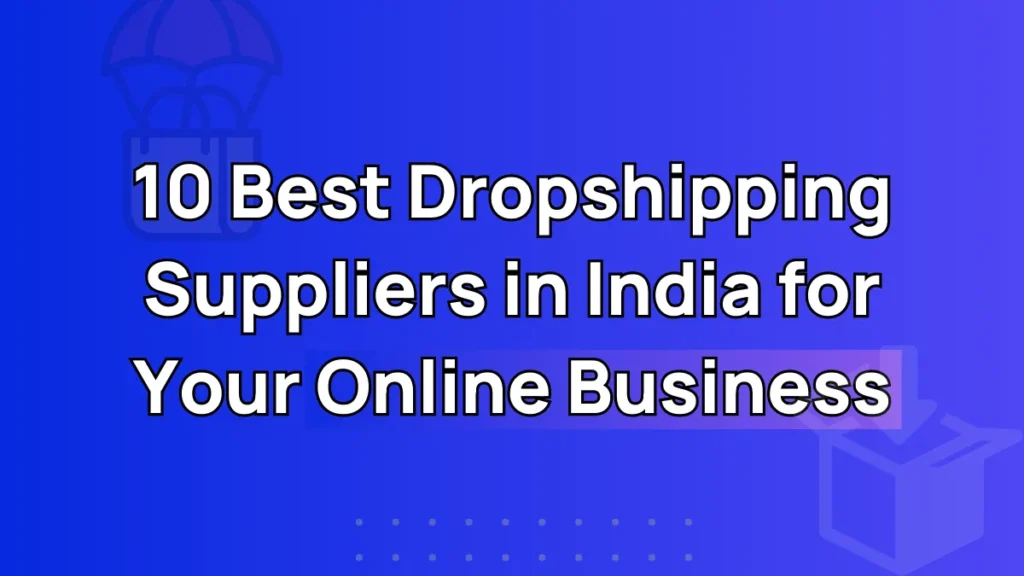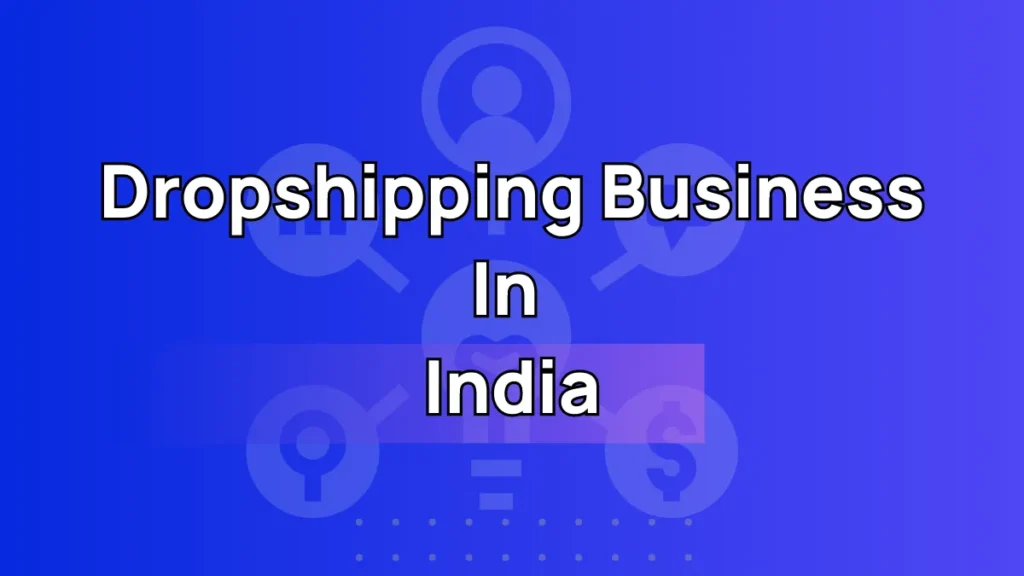Ah, ecommerce platforms. The digital equivalent of a brick-and-mortar store. A place where you can showcase your products, sell them to customers and make a profit without ever leaving your home.
But with so many options out there, how do you choose the right one for your business?
Table of Contents
In this blog post, we’re going to take a deep dive into the world of ecommerce platforms in India and compare the seven best ones available.
We’ll go through the pros and cons of each platform, their features, pricing, user experience, and customer support, and provide examples of successful stores on each one.
So, buckle up and get ready for a wild ride through the world of ecommerce. We’ll be your guide, and I’ll be your Stephen King-esque narrator for this journey.
Explanation of Ecommerce Platforms in India
Before we dive into the comparison, let’s take a moment to understand what an ecommerce platform is.
An ecommerce platform is a software application that allows businesses to create and manage online stores. These platforms typically provide website templates, payment gateways, inventory management tools, and other features to help businesses sell their products or services online.
Think of it like building a house. You have the land (your domain), the foundation (the platform), and then you build the walls (your products) on top of that. Without a solid foundation, your house will crumble, and the same goes for your ecommerce business.
Importance of Choosing the Right Platform
Choosing the right ecommerce platform is crucial for the success of your business. It can mean the difference between a thriving online enterprise and a complete failure.
Not all platforms are created equal, and not all platforms are suitable for every business. Some are better for small businesses, while others are geared toward larger enterprises. Some offer more customization options, while others are more affordable.
It’s important to choose a platform that aligns with your business needs and goals. Take the time to research and evaluate different platforms before making a decision. This will save you time, money, and headaches in the long run.
Why Choose an Ecommerce Platform Suited for India?
India is a rapidly growing market for ecommerce, with millions of new internet users coming online every year. It’s projected to become the second-largest ecommerce market in the world by 2034, with a value of $300 billion.
Choosing an ecommerce platform suited for India means you’ll have access to localized features, payment gateways, and integrations that cater to the Indian market. This will give you a competitive edge and increase your chances of success.
Now that we’ve covered the basics, let’s jump into our comparison of the seven best ecommerce platforms in India.
7 Best Ecommerce Platforms in India
1. Shopify
First up, we have Shopify. Launched in 2006, Shopify has grown to become one of the most popular ecommerce platforms in the world, powering over 1 million businesses in 175 countries.

Pros:
Cons:
Features:
Shopify offers a wide range of features, including:
- Website builder with customizable templates
- Product management tools
- Order management system
- Inventory management tools
- Payment gateway integration
- Shipping and tax calculation
- Analytics and reporting tools
- Marketing and SEO tools
Pricing:
Shopify offers three pricing plans in India:
- Basic Shopify – ₹2,700/month
- Shopify – ₹7,000/month
- Advanced Shopify – ₹21,000/month
Examples of Successful Stores on Shopify in India:
Also Read: A Comprehensive Shopify Review for Entrepreneurs
2. WooCommerce
Next up, we have WooCommerce. Unlike Shopify, which is a standalone platform, WooCommerce is a plugin for WordPress, the world’s most popular content management system.
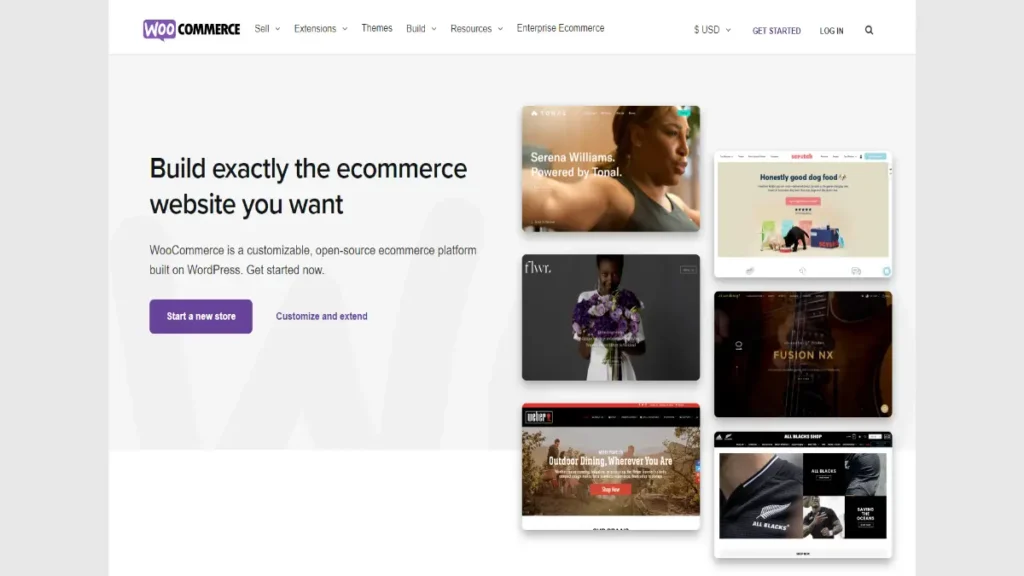
Pros:
Cons:
Features:
WooCommerce offers a range of features, including:
- Customizable website templates
- Product management tools
- Order management system
- Payment gateway integration
- Shipping and tax calculation
- Analytics and reporting tools
- Marketing and SEO tools
Pricing:
WooCommerce is free to download and use, but you’ll need to pay for web hosting and other related costs. This makes it a more affordable option than other platforms.
Examples of Successful Stores on WooCommerce in India:
Also Read: The Ultimate Woocommerce Review Every Online Seller Needs
3. Wix eCommerce
Wix is a popular website builder and an ecommerce platform called Wix eCommerce. It’s known for its ease of use and affordable pricing.
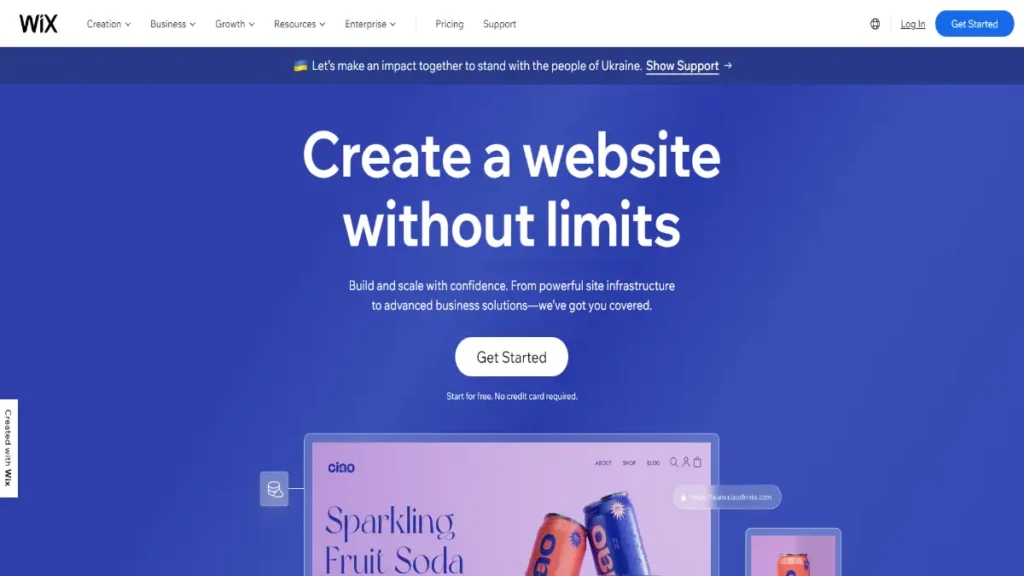
Pros:
Cons:
Features:
Wix eCommerce offers a variety of features, including:
- Website builder with customizable templates
- Product management tools
- Order management system
- Payment gateway integration
- Shipping and tax calculation
- Analytics and reporting tools
- Marketing and SEO tools
Pricing:
Wix eCommerce has three pricing plans:
- Business Basic – ₹325/month
- Business Unlimited – ₹725/month
- Business VIP – ₹1,125/month
Examples of Successful Stores on Wix eCommerce in India:
Also Read: A Brutally Honest Wix Review You Need to Read!
4. Squarespace Commerce
Squarespace is a website builder offering an ecommerce platform called Squarespace Commerce. It’s known for its sleek design and user-friendly interface.
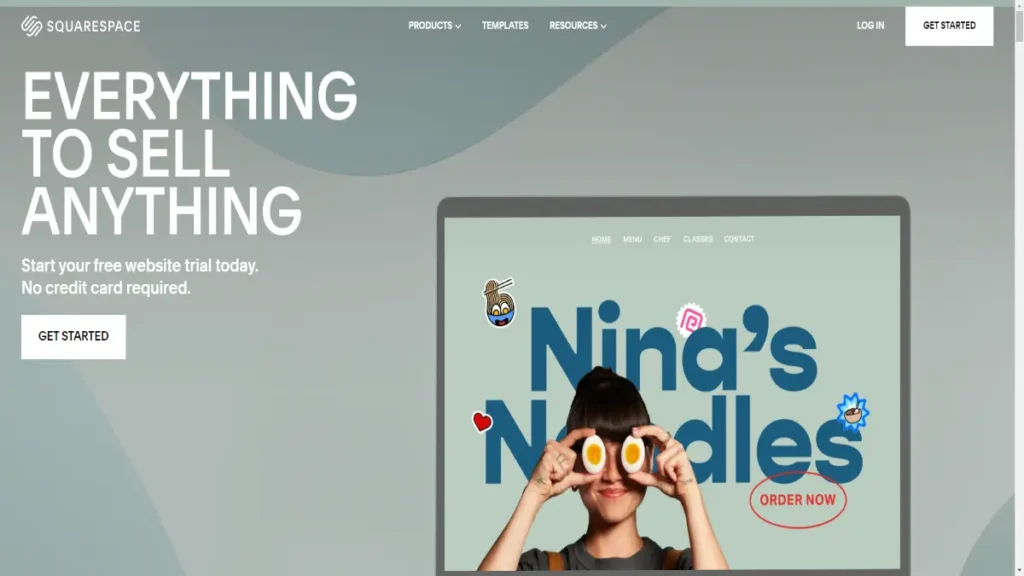
Pros:
Cons:
Features:
Squarespace Commerce offers a range of features, including:
- Customizable website templates
- Product management tools
- Order management system
- Payment gateway integration
- Shipping and tax calculation
- Analytics and reporting tools
- Marketing and SEO tools
Pricing:
Squarespace Commerce has two pricing plans:
- Basic Commerce – ₹800/month
- Advanced Commerce – ₹2,000/month
Examples of Successful Stores on Squarespace Commerce in India:
- Red Polka
- Akanksha Gajria
- Sutatva
5. Dukaan
Dukaan is a new player in the ecommerce market, launched in 2020. It aims to make setting up an online store as simple as possible for small businesses in India.
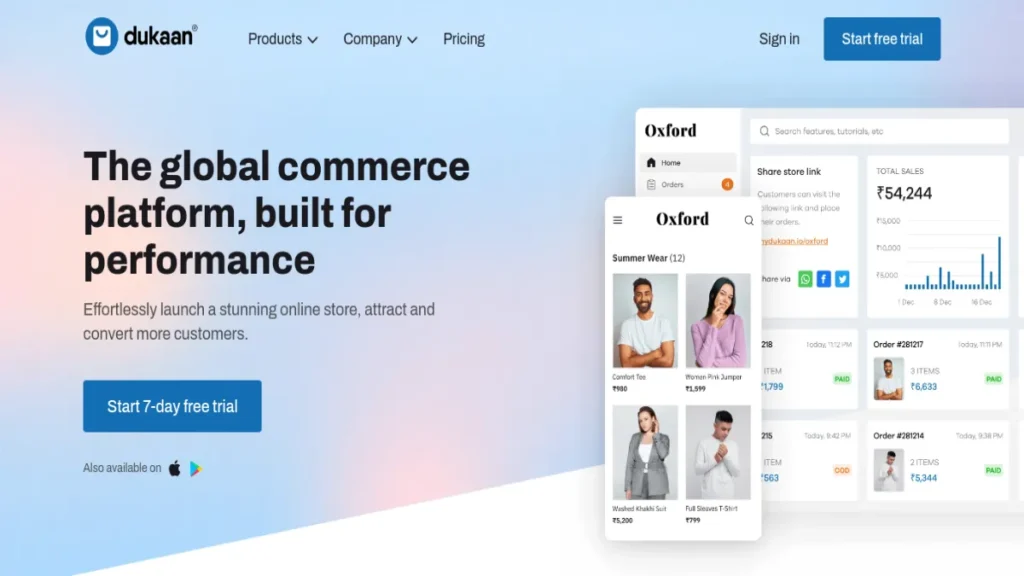
Pros:
Cons:
Features:
Dukaan offers a range of features, including:
- Customizable website templates
- Product management tools
- Order management system
- Payment gateway integration
- Shipping and tax calculation
- Analytics and reporting tools
Pricing:
Dukaan has three pricing plans:
- Free plan
- Pro plan – ₹499/month
- Premium plan – ₹999/month
Examples of Successful Stores on Dukaan in India:
- The Wicker Basket
- The Green Snack Co.
- Pink Lemonade
Also Read: An Insider’s Unfiltered Dukaan Review for Business Success
6. BigCommerce
BigCommerce is a popular ecommerce platform that’s used by businesses of all sizes. It’s known for its scalability and flexibility.
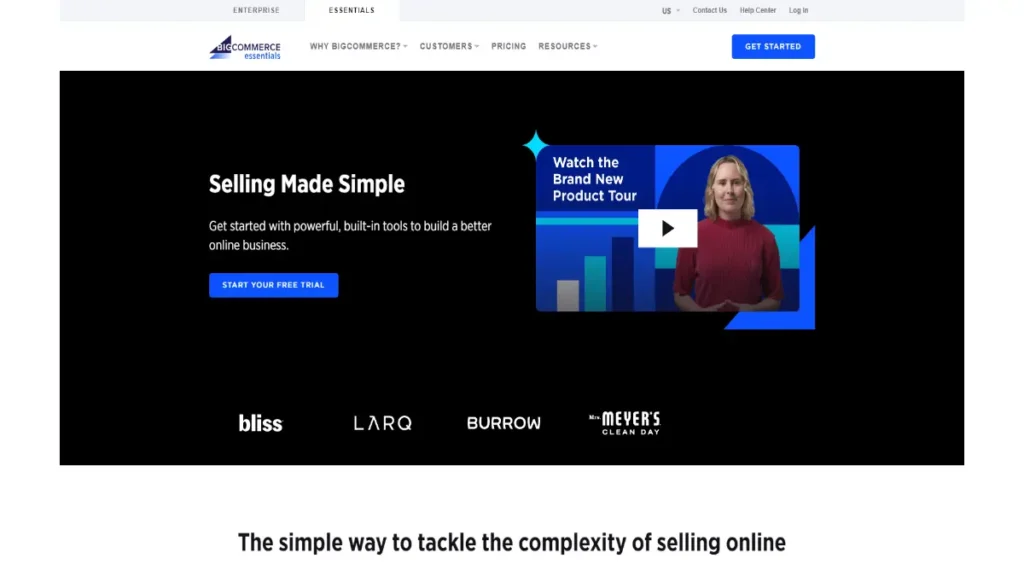
Pros:
Cons:
Features:
BigCommerce offers a range of features, including:
- Customizable website templates
- Product management tools
- Order management system
- Payment gateway integration
- Shipping and tax calculation
- Analytics and reporting tools
- Marketing and SEO tools
Pricing:
BigCommerce has four pricing plans:
- Standard – ₹1,590/month
- Plus – ₹7,574/month
- Pro – Contact sales
- Enterprise – Contact sales
Examples of Successful Stores on BigCommerce in India:
- FoxyMoron
- Kalki Fashion
- Urban Ladder
7.Zoho Commerce
Zoho Commerce is an ecommerce platform offered by Zoho, a popular software company. It’s known for its affordability and ease of use.
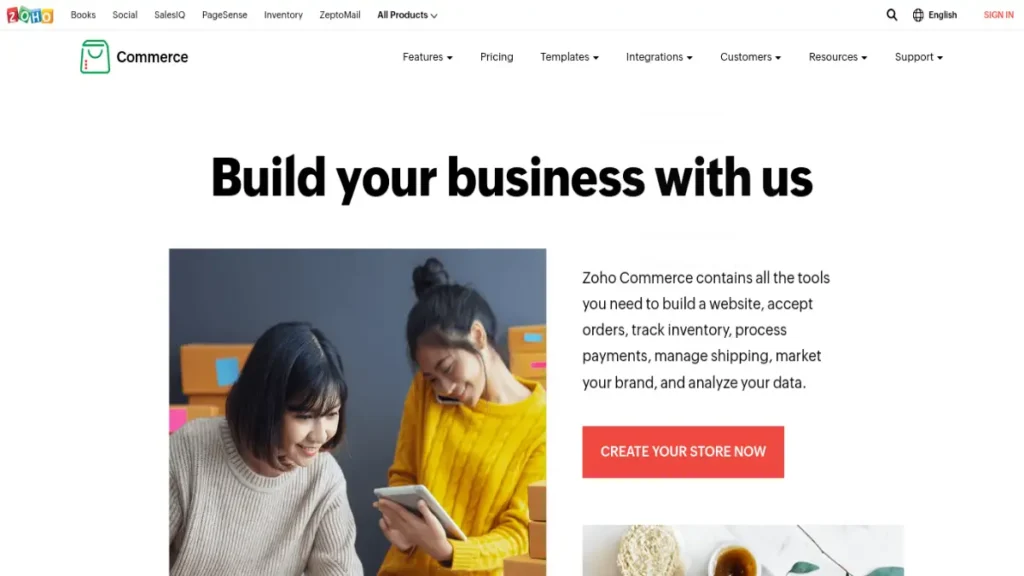
Pros:
Cons:
Features:
Zoho Commerce offers a range of features, including:
- Customizable website templates
- Product management tools
- Order management system
- Payment gateway integration
- Shipping and tax calculation
- Analytics and reporting tools
- Marketing and SEO tools
Pricing:
Zoho Commerce has two pricing plans:
- Basic – ₹2,700/month
- Professional – ₹5,400/month
Examples of Successful Stores on Zoho Commerce in India:
- Organic Tattva
- Vahdam Teas
- ArtisanGilt
Ecommerce Platforms in India Comparison Table
To compare the seven ecommerce platforms, we looked at several factors, including user experience, customization options, pricing, customer support, features, and security.
Here’s a comparison table with the key features of each platform:
| Platform | User Experience | Customization Options | Pricing | Customer Support | Features | Security |
| Shopify | Easy to use | Great design options | Expensive | Excellent customer support | Wide range of features | High |
| WooCommerce | Moderate difficulty | Highly customizable | Free (additional costs) | Limited customer support | Wide range of features | High |
| Wix eCommerce | Easy to use | Limited customization options | Affordable | Slow customer support | Wide range of features | High |
| Squarespace Commerce | Easy to use | Limited customization options | Expensive | Limited customer support | Wide range of features | High |
| Dukaan | Very easy to use | Limited customization options | Affordable | Limited customer support | Essential features | High |
| BigCommerce | Moderate difficulty | Highly customizable | Expensive | Good customer support | Wide range of features | High |
| Zoho Commerce | Very easy to use | Limited customization options | Affordable | Good customer support | Essential features | High |
Ecommerce platforms selection criteria
When choosing an ecommerce platform, there are several factors to consider, including:
- User Experience:
Consider how easy the platform is to use, and whether you’ll be able to build your store without any technical knowledge.
- Customization Options:
Consider how much control you’ll have over the design and functionality of your store.
- Pricing:
Consider whether the platform fits within your budget, and whether there are any hidden costs or transaction fees.
- Customer Support:
Consider the level of customer support offered by the platform, and whether there’s a community of users who can provide assistance.
- Features:
Consider the range of features offered by the platform, and whether they align with your business needs and goals.
- Security:
Consider the level of security offered by the platform, and whether they comply with standards like PCI DSS (Payment Card Industry Data Security Standard).
Conclusion
Choosing the right ecommerce platform is crucial to the success of your online store. Each platform has its own strengths and weaknesses, so it’s important to evaluate them based on your specific business needs and goals.
Shopify is a great option for those looking for an all-in-one solution with excellent customer support, while…
WooCommerce is a more affordable option with high customization options.
Wix eCommerce is a good choice for beginners who want an easy-to-use platform,
While…
Squarespace Commerce is best for those who prioritize sleek design.
Dukaan is a new player in the market that caters to small businesses with essential features,
While…
BigCommerce is highly scalable but may require some technical knowledge.
Zoho Commerce is another affordable option with a user-friendly interface.
Ultimately, the decision comes down to your budget, technical expertise, and business goals.
People Also Ask “Ecommerce Platforms In India”
Is it possible to customize the checkout process on ecommerce platforms in India?
Customizing the checkout process can be important for optimizing conversions and reducing cart abandonment rates. Most ecommerce platforms offer some level of customization when it comes to the checkout process. For example, BigCommerce allows you to add custom fields to collect additional information from customers during checkout.
Which ecommerce platforms in India offer the best SEO optimization tools?
Search engine optimization (SEO) is critical for driving organic traffic to your online store. While all ecommerce platforms offer some level of SEO support, some are better than others. For example, Shopify has built-in SEO features like customizable title tags and meta descriptions, while Squarespace Commerce allows you to customize URLs and page titles for each product page.
Do ecommerce platforms in India offer multilingual support for international customers?
If you’re selling internationally or targeting customers who speak different languages, having multilingual support can be crucial. Some ecommerce platforms offer built-in multilingual support, while others require third-party apps or plugins. For example, Dukaan allows you to translate your store into multiple languages automatically, while Wix eCommerce offers a translation app.
Can I sell digital products or services on ecommerce platforms in India?
Yes, most ecommerce platforms in india allow you to sell digital products or services, such as ebooks, courses, or software downloads. For example, WooCommerce offers a variety of plugins that enable you to sell digital products with ease.
Are there any restrictions on the number of products I can sell on ecommerce platforms in India?
The number of products you can sell on an ecommerce platform in India varies depending on the plan and pricing model. Some platforms have limits on the number of products you can list, while others allow unlimited listings. For example, Shopify’s basic plan allows up to 2,500 products, while its advanced plan allows unlimited products.
Which ecommerce platforms in India offer the most advanced analytics and reporting tools?
Analytics and reporting tools are critical for tracking your store’s performance and making data-driven decisions. Some ecommerce platforms in India offer more advanced analytics and reporting tools than others. For example, BigCommerce offers detailed reports on sales, customers, and order trends, while Zoho Commerce provides real-time analytics and conversion tracking.
Which ecommerce platforms in India offer the most flexible pricing plans and features?
The pricing plans and features offered by ecommerce platforms can vary greatly depending on your business needs and budget. Some platforms offer more flexibility in terms of pricing and features than others. For example, Shopify offers a range of pricing plans and add-ons that allow businesses to scale up or down based on their needs.

